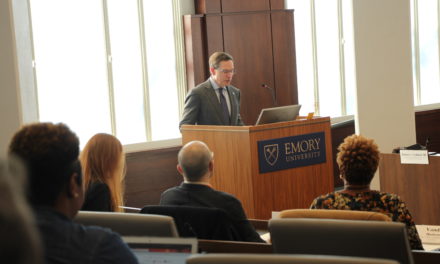Renowned fiction authors Alice Walker and Pearl Cleage discussed how being African American women impacted their writing and creative thought process Tuesday afternoon.
The event, which took place in Cannon Chapel, occurred as a result of Walker and Cleage adding their papers to Emory University’s Manuscript, Archives and Rare Book Library (MARBL).
The session followed a question-answer format. Valerie Boyd – known for her biography of Zora Neale Hurston, Wrapped in Rainbows, moderated the event. Mostly Atlanta residents and a handful of Emory students attended.
Walker, critically acclaimed for her Pulitzer-winning novel The Color Purple, has written numerous books, poems and short stories about race and gender.
Cleage, a professor of drama at Spelman College, has covered similar topics in her novels, exploring the African American female perspective. Most recently, Cleage’s play What I Learned in Paris was showed at the Alliance Theatre in Atlanta.
Boyd asked each woman about her creative process, how this process has changed over the course of her career and how she arrives at a finished piece of work. According to both women, the writing process and the characters in their stories dictate how the story unfolds.
“If you are patient, in my experience, what wants to be expressed will be expressed,” said Cleage, specifically referring to her love of the theater.
Cleage explained that writing novels specifically is a challenge because it requires the author to create the text in addition to the setting, whereas playwriting contains only the writing component.
When one audience member mentioned to Walker that her books are difficult to finish, Walker advised her: “Don’t fault the writer because it’s too hard for you to read.”
Walker added that the key to understanding the United States is being able to understand its history, which means facing the struggles of African American women in literature.
“I didn’t think about feminism or sexism or gender until my 20s or 30s,” Cleage, a contemporary of Walker’s, said as she recalled her experience reading The Color Purple.
She said Walker’s book was the first time she considered her own identity in terms of gender instead of race.
“I appreciated The Color Purple because it taught me that you can’t be a black person Monday, Wednesday, Friday and be a black woman Tuesday, Thursday,” Cleage said.
The audience consisted of mostly older, black women who stood up to ask questions, some of which alluded to a sense of self-identification with Walker’s and Cleage’s works and experiences.
Yvonne Green, a Centers for Disease Control and Prevention (CDC) employee, said, “We knew them 30 years ago; they’ve traveled the journey with us. Their specifics might be our specifics too.”
Having recently contributed to MARBL, the women revealed what items they hope people will pay attention to.
Walker said she had 40 years of journals containing her thoughts that she kept throughout her career, about which she joked, “What was I thinking?”
According to Cleage, it was difficult to let go of papers from when she was 18 and 25, especially all of her letters, because holding certain pieces of nostalgia is “the idea of preserving what was important to [her].”
At the conclusion of the event, Walker read an excerpt from The Color Purple as a celebration of the 30th anniversary of its publication. Three generations of people in the audience listened, reminisced and even chuckled as Walker’s voice echoed throughout the chapel.
By Rupsha Basu
The Emory Wheel was founded in 1919 and is currently the only independent, student-run newspaper of Emory University. The Wheel publishes weekly on Wednesdays during the academic year, except during University holidays and scheduled publication intermissions.
The Wheel is financially and editorially independent from the University. All of its content is generated by the Wheel’s more than 100 student staff members and contributing writers, and its printing costs are covered by profits from self-generated advertising sales.





